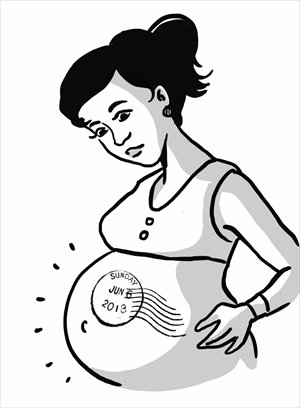Maternity tourism damages both countries

The immigration officers stationed at the international airport in Seattle probably never thought their work would be tougher because of a Chinese movie based in the city. They were dogged not so much by a sudden influx of Chinese tourists who were enchanted by the sleepless city, but by those who were pregnant and wanting to give birth there.
The movie, Finding Mr. Right, directed by Xue Xiaolu and starring Tang Wei and Wu Xiubo, is meant to be a tribute to Nora Ephron's 1993 classic Sleepless in Seattle. But its love story is between a pregnant concubine who went to the city from China to deliver a baby and the driver working for local maternity centers that cater to these pregnant Chinese women.
According to media reports, since the movie was released earlier this year, Seattle airport has seen more pregnant Chinese women arrive. Some were declined entry and sent back to China immediately.
Chinese are not the only ones coming to deliver in the US. Maternity tourism has been a long-term headache for the US, which automatically grants everyone born in the country US citizenship.
However, US law enforcement has never taken it as seriously as when a wave of expectant Chinese mothers hit the shore in recent years, thanks to the sheer volume and the sophisticated industry of services that has been established around them.
For $10,000 to $20,000, agencies located in China and in the US can smooth the way for clients' visa applications and pre and post natal care. Some even offer to help clients apply for Medicaid, a government-sponsored health insurance plan that can cover the maternity costs for low-income people in the US.
In Los Angeles, the authorities have started to crack down on such maternity centers. In Seattle, custom officers recently received an order demanding they carefully check pregnant foreigners, according to one local Chinese language newspaper.
I am not surprised. Even without the temptation from the Medicaid system for a low-cost delivery, a baby with US citizenship can come back to this country without paying the hefty tuition fees for international students. When they turn 21, they can apply for permanent residency for their parents, who can then come to the US to enjoy a relaxed retirement.
What strikes me is the way Chinese people talk about this. The agencies who promote this business say, "you pay us 100,000 yuan ($16,260), we give you back a 9.8-million-yuan American baby."
The media covers it by laying out the benefits and the risks as if going to the US to deliver a baby is just an investment like going there to buy an apartment.
Those who have successfully become mothers of US citizens proudly post their tips on their popular blogs for other expectant mothers, including ways to hide your bulging belly from immigration officers.
No one seems to think there is anything wrong with this.
This is a sharp contrast to the public reaction when a boy from Nanjing was found to have left graffiti on the relics of Egypt. The boy was made public enemy No. 1 by furious netizens who believed his reckless behavior made all Chinese "lose face." His name and address were uncovered and posted online and even the website of his school was hacked to remind visitors about what he had done.
The incident also triggered a national debate on how to improve the international reputation of Chinese tourists.
But is graffiti with a Chinese name tag among similar graffiti in various languages at a tourism site more damaging to China's reputation?
Many Chinese living in the US don't think so, judging by the furious comments left on the websites of local Chinese language newspapers about maternity tourists from their home country.
In China, finding loopholes may still be considered acceptable, if not respected as smart. Examples include the ways in which married couples can buy second homes - avoiding restrictions - by divorcing and then remarrying their partners a few years later.
But we should ask whether we should take advantage of loopholes just because they exist. People living in China may feel little heat over maternity tourism because the costs are borne by other countries. But if we cannot come up with the correct answer to this question, it will eventually be at our own expense.
The author is a New York-based journalist. rong_xiaoqing@ hotmail.com